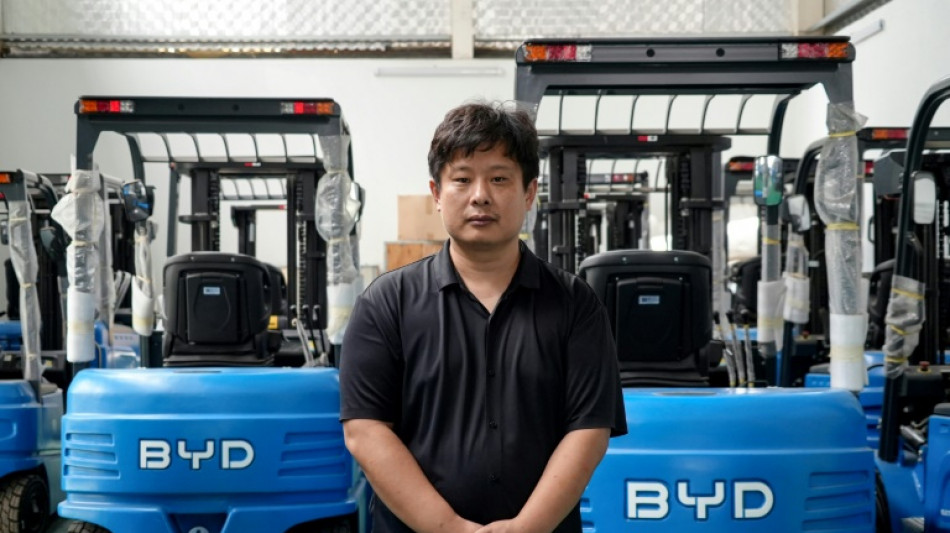
RBGPF
63.0000


A year ago Zhang Chundong helped the firm he manages expand into Vietnam, part of a wave of Chinese businesses to choose the booming manufacturing hub since the trade war of US President Donald Trump's first term.
Now the company -- a distributor of forklifts made by China's BYD -- is struggling to achieve the fast growth it expected as factory projects stall, and Vietnam waits to see if an enormous 46 percent tariff threatened by Trump this month will materialise.
"Some factories that we received orders from are almost ready for operation, but since the tariff news, we got notice that projects and the purchasing of our forklifts are on hold," said Zhang, manager at Huochacha New Energy Group, whose clients in Vietnam include Chinese electronics company TCL.
"We should be in a stage of a rapid growth... (but) due to the tariffs, we are not," he told AFP.
Many Chinese businesses in Vietnam, particularly those exporting directly to the United States, in theory find themselves in a better position than they would be at home, with Beijing already facing levies of up to 145 percent on many products.
Hanoi -- like much of the rest of the world -- has been hit with a blanket 10 percent tariff and has a short window before delayed reciprocal levies come into force in July. There's still hope that the figure can be negotiated down.
But in Vietnam's northern industrial Bac Ninh province, Chinese businesses that AFP interviewed -- most of whom are linked to the export supply chain -- said investors were hesitating and anxiety was widespread.
Zhang, 39, said he had confidence in the negotiations but explained that three or four of the firm's projects were on hold.
"I've talked with a few clients... and the answers at the moment are all the same, we need to keep waiting."
- Investment surge -
In Bac Ninh, around 40 kilometres from Hanoi by road, restaurants, massage parlours and convenience stores with Chinese signs jostle for space with Korean shops and eateries.
South Korea has long been a huge investor in Vietnam, with electronics giants such as Samsung and LG both in Bac Ninh -- but China is fast catching up.
Around 10,000 Chinese people lived in the province by the end of 2023, the latest figure available, and expats in the area said the figure had likely surged since then.
"In recent years, Vietnam’s economy has been developing, and China and US keep having trade friction, so many companies that were hesitant before came to Vietnam these two years," said Wang Hongxin, 40, who moved to Vietnam more than a decade ago to work with a Samsung supplier.
One of them is Vietnam Kepai, a Chinese firm which makes computer numerical control machines and expanded into Bac Ninh last month, in search of new markets and to escape fierce competition back home.
"There are many companies that are successful in China hoping to explore the market in Vietnam. I've heard this conversation so many times in Chinese restaurants (here)," said Li Pingwu, the firm's 33-year-old manager.
The nation ranked third among Vietnam’s top investors in 2024, behind only Singapore and South Korea, with a more than three percent jump compared to the previous year.
It also led in terms of new investment projects, representing more than a quarter of all newly registered initiatives.
- Hours cut -
This influx is what appeared to provoke Trump as he announced huge tariffs on Vietnam in early April, with Washington accusing the country of facilitating Chinese exports to the United States and allowing Beijing to get around tariffs.
Although a 2024 report by the International Monetary Fund said there was "no clear evidence" of Vietnam's role in facilitating Chinese exports to the United States, manager Zhang admitted he had seen this happening.
"Some of our clients including the ones selling floorboards or moulding machines are doing entrepot trading, involving exports to the US," he said.
Vietnam's trade ministry has ordered authorities to tighten control over the origin of goods to avoid sanctions by trading partners in the wake of the threatened US tariffs, according to a document seen by AFP on Tuesday.
One businessman in Bac Ninh said the surge in investment had once created a worker shortage, but the situation for Vietnamese staff at Chinese companies is now uncertain.
Hung, who earns about $270 a month working at a Chinese company producing exterior parts for desktop monitors, said his hours had been cut.
"We have stopped getting to work overtime," said the 30-year-old, who declined to give his full name. "I don't know how life will be now, as it's so hard to live here with what I earn."
Wang admitted he was "anxious".
"We originally planned to upgrade some equipment for long-term development, but... because the investment will be quite big, we are a little hesitant now," he said.
L.Kwan--ThChM